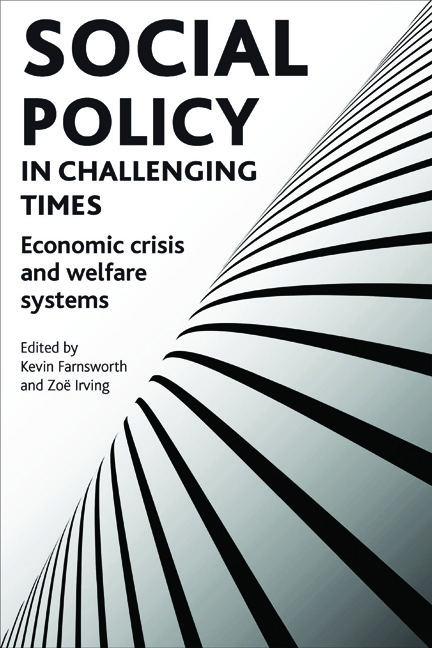Book contents
- Frontmatter
- Contents
- List of figures and tables
- Notes on contributors
- Acknowledgements
- one Varieties of crisis
- two The economic crisis and paradigm change
- three From financial crisis to fiscal crisis
- four Credit crunch, inequality and social policy
- five Global social policy responses to the economic crisis
- six Poverty, the crisis and social policy responses developing countries in developing countries
- seven South Korea after the 1997 economic crisis: a ‘paradigm shift’?
- eight China's response to crisis: what role for social policy?
- nine Tiptoeing through crisis? Re-evaluating the German social model in light of the global recession
- ten Ireland and the impact of the economic crisis: upholding the dominant policy paradigm
- eleven Waving not drowning: Iceland, kreppan and alternative social policy futures
- twelve Experiences from two financial crises in the Nordic welfare states: 1990-93 and 2008-10 compared
- thirteen Social policy and the recent economic crisis in Canada and the United States
- fourteen From economic crisis to a new age of austerity: the UK
- fifteen Responding to the challenges: some concluding remarks on welfare futures in changed circumstances
- Bibliography
- Index
seven - South Korea after the 1997 economic crisis: a ‘paradigm shift’?
Published online by Cambridge University Press: 07 September 2022
- Frontmatter
- Contents
- List of figures and tables
- Notes on contributors
- Acknowledgements
- one Varieties of crisis
- two The economic crisis and paradigm change
- three From financial crisis to fiscal crisis
- four Credit crunch, inequality and social policy
- five Global social policy responses to the economic crisis
- six Poverty, the crisis and social policy responses developing countries in developing countries
- seven South Korea after the 1997 economic crisis: a ‘paradigm shift’?
- eight China's response to crisis: what role for social policy?
- nine Tiptoeing through crisis? Re-evaluating the German social model in light of the global recession
- ten Ireland and the impact of the economic crisis: upholding the dominant policy paradigm
- eleven Waving not drowning: Iceland, kreppan and alternative social policy futures
- twelve Experiences from two financial crises in the Nordic welfare states: 1990-93 and 2008-10 compared
- thirteen Social policy and the recent economic crisis in Canada and the United States
- fourteen From economic crisis to a new age of austerity: the UK
- fifteen Responding to the challenges: some concluding remarks on welfare futures in changed circumstances
- Bibliography
- Index
Summary
Introduction
The modern Western welfare state has its roots in the notion of an entitlement deriving from the citizenship model as expounded by T.H. Marshall (1950). What thereby becomes a social right to welfare has deeply influenced the development of welfare systems in Western countries, although different countries have established different national standards of social rights and these have been expressed through different programmes (Marshall, 1950; Esping-Andersen, 1990). However, faced with recurrent economic crises and the resultant ‘fiscal crisis of the state’ (O’Connor, 1973; Gough, 2000), Western welfare states have, in general, shifted from concern with the amelioration of market inequalities, to a concern with the marketisation of public services and the individualisation of social risk. Welfare systems based on the idea of social rights are also moving away from welfare and towards ‘welfare-to-work’ (workfare) systems for those able to work, by shifting emphasis from rights to duties and by introducing more conditions and means testing on previously universally guaranteed welfare schemes. For example, the recent United Kingdom (UK) government's welfare reform White Paper, entitled 21st Century Welfare (DWP, 2010), again confirms a direction towards workfare and concomitant enhanced individual responsibility: ‘Work and personal responsibility must be at the heart of the new benefits system. This should provide support backed up by a strong system of conditionality that makes clear what is expected of claimants in return for the support they receive’ (DWP, 2010, Chapter 1).
While Western welfare states, under the pressure of a globalised neoliberal economic order, are moving towards workfare systems characterised by the retrenchment of social rights, the South Korean welfare system, called the National Basic Livelihood Security System (NBLSS), already incorporated a workfare element as early as the late 1990s as a response to the effects of the 1997 Asian economic crisis (AEC). However, the establishment of workfare in South Korea appears to represent a case for neither the ‘shrinking welfare state’ under globalisation nor the shifting emphasis from rights to duties that currently dominates Western welfare state thinking. Rather than substantiating the expectation that welfare systems retrench in the wake of economic crises and the resultant economic restructuring that generally follows, the AEC and the resultant economic restructuring demanded by the International Monetary Fund (IMF) and the World Bank (WB) in the case of South Korea, was actually accompanied by an expansion of the welfare system in significant ways.
- Type
- Chapter
- Information
- Social Policy in Challenging TimesEconomic Crisis and Welfare Systems, pp. 119 - 138Publisher: Bristol University PressPrint publication year: 2011



